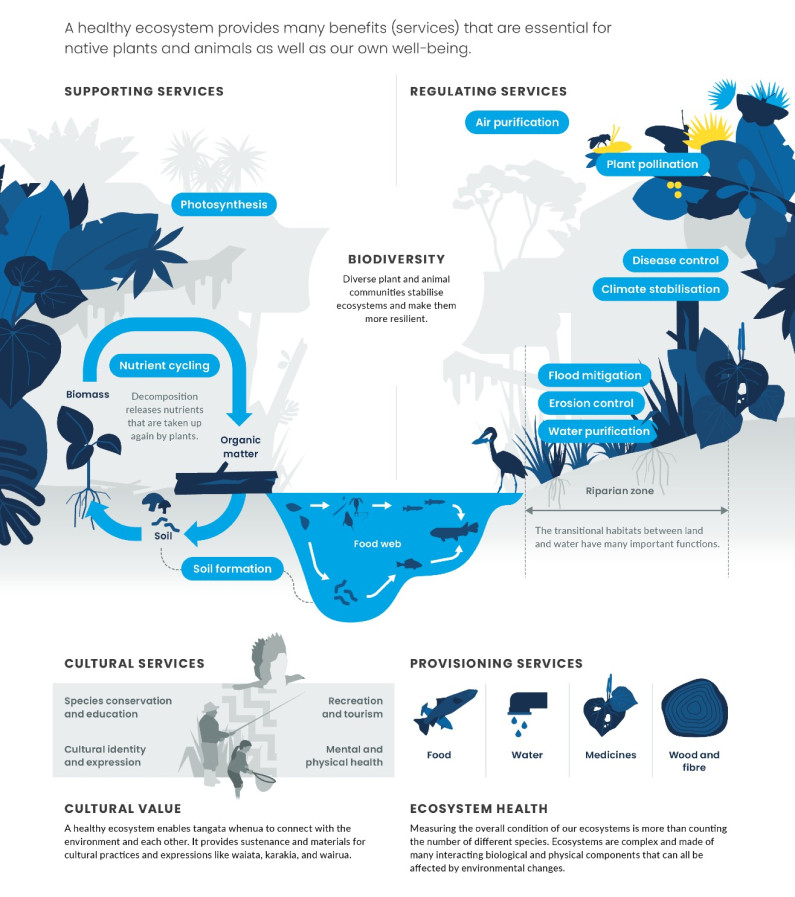Why biodiversity matters
The biodiversity of Aotearoa New Zealand is essential to our culture, identity, and well-being. Discover more about New Zealand’s biodiversity and why it matters.
The biodiversity of Aotearoa New Zealand is essential to our culture, identity, and well-being. Discover more about New Zealand’s biodiversity and why it matters.
Our biodiversity is unique to Aotearoa and irreplaceable. Our biodiversity includes the whole variety of native:
New Zealand has a high proportion of native species that are found nowhere else in the world.
Our native species and ecosystems are particularly vulnerable to:
We know of 79 species that have gone extinct in Aotearoa since humans arrived. This is due to habitat changes, harvesting pressure, and/or introduced predators.
Despite some successes in species management, we continue to lose biodiversity.
Many ecosystems and species remain at risk. Over three-quarters of our reptiles, birds, bats, freshwater fish and frog species are threatened or at risk of becoming threatened with extinction.
People connect with biodiversity in many ways, whether it’s enjoying and recognising familiar flowering plants like kōwhai in their neighbourhood, or the encounters with native species such as kererū, pingao, pūriri moths, titiwai (glow worms) that they may come across when camping, tramping, fishing, gathering or hunting.
Our biodiversity is fundamental to Māori culture. Nature and people are entwined through:
This relationship is reciprocal: the people are kaitiaki (guardians) of the natural world, and the natural world is kaitiaki of the people.
Our biodiversity contributes to Aotearoa’s national identity through taonga such as kiwi and the silver fern.
Our biodiversity provides us with ‘ecosystem services’, goods and services like water filtration, clean air, and food.
A loss of biodiversity can weaken an ecosystem and its ability to recover from stress and change, which can result in collapse. The loss of species and ecosystems, and the services they provide, threatens health and food security, the economy, and individual livelihoods.

A healthy ecosystem provides many benefits (services) that are essential for native plants and animals as well as our own well-being.
Supporting services
Photosynthesis
Nutrient cycling
Decomposition releases nutrients that are taken up again by plants.
Soil formation
Regulating services
Air purification
Plant pollination
Disease control
Climate stabilisation
Flood mitigation
Erosion control
Water purification
Biodiversity
Diverse plant and animal communities stabilise ecosystems and make them more resilient.
Riparian zone
The transitional habitats between land and water have many important functions.
Cultural services
Species conservation and education
Cultural identity and expression
Recreation and tourism
Mental and physical health
Provisioning services
Food
Water
Medicines
Wood and fibre
Cultural value
A healthy ecosystem enables tangata whenua to connect with the environment and each other. It produces sustenance and materials for cultural practices and expressions like waiata, karakia, and wairua.
Ecosystem health
Measuring the overall condition of our ecosystems is more than counting the number of different species. Ecosystems are complex and made of many interacting biological and physical components that can all be affected by environmental changes.
Subscribe to receive the latest news, updates, and stories from the Ministry for the Environment.